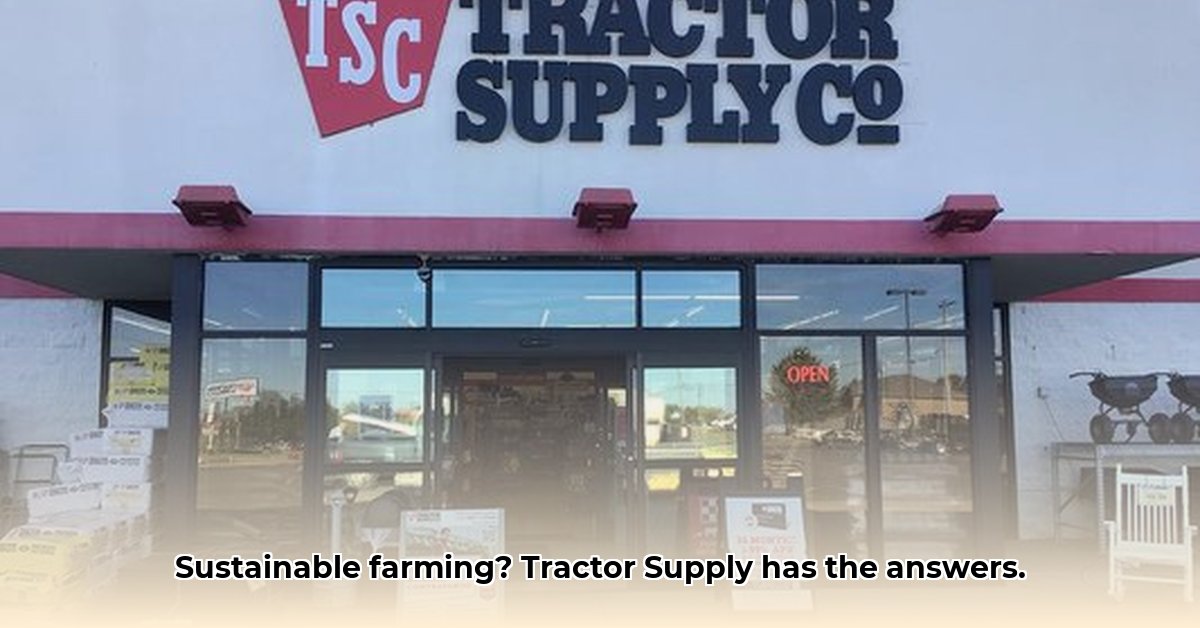
Tractor Supply Morehead, Kentucky: A Surprisingly Sustainable Partner?
Morehead, Kentucky's agricultural landscape boasts a rich history, but modern farmers are increasingly embracing sustainable practices. Intriguingly, Tractor Supply Company (TSC), a familiar farm supply store, plays an often-overlooked role in this shift. This article explores TSC's indirect yet significant contribution to sustainable agriculture in Morehead, examining its product offerings, highlighting limitations, and proposing actionable steps for all stakeholders. We'll delve into how local farmers and gardeners can leverage TSC's resources for sustainable farming, while acknowledging the challenges and opportunities for the future. For more information on this specific location, visit the Morehead TSC page.
TSC Morehead: Beyond Tractors and Tools
A visit to the Morehead Tractor Supply reveals a diverse inventory: seeds, fertilizers, tools, livestock feed—a one-stop shop for rural needs. While TSC doesn't explicitly brand itself as a "sustainability" retailer, its product range offers numerous tools for sustainable farming and gardening. A local farmer might utilize TSC's fertilizer to optimize crop yields while minimizing environmental impact, while a homeowner could find a water-efficient irrigation system. The key lies in informed consumer choices and the effective application of available resources. But how can we ensure these resources are used sustainably? Isn't it a bit like putting the cart before the horse?
Access and Choice: The Unsung Power of TSC
TSC’s value lies not in its explicit promotion of sustainability, but in its provision of broad product access – the essential building blocks for sustainable practices. The farmer, gardener, or homeowner ultimately determines how these resources are used. The decision to opt for environmentally friendly approaches rests with the consumer. This isn't a critique of TSC; it acknowledges their role as a valuable resource provider, underscoring the consumer's responsibility in embracing sustainable methods. TSC provides the ingredients; we dictate the recipe. But how can we ensure everyone understands this recipe?
Actionable Steps Towards Greener Practices
Here's a plan for enhancing sustainable practices related to Tractor Supply in Morehead, Kentucky:
For Tractor Supply:
- Within One Year: Conduct a comprehensive environmental impact assessment of the entire supply chain, focusing on sourcing, packaging, waste reduction, and exploring more sustainable supplier partnerships.
- Within 3-5 Years: Implement a holistic sustainability plan, increasing eco-friendly product offerings, developing educational resources on sustainable agricultural techniques, and enhancing supply chain transparency. Consider collaborations with local sustainable agriculture organizations.
For Kentucky Farmers and Gardeners:
- Immediate Actions: Optimize the efficiency of TSC-sourced resources. Implement water-saving irrigation, minimize fertilizer waste, and adopt composting techniques.
- Long-Term Commitment: Actively participate in educational opportunities on sustainable farming, including workshops, online courses, and farmers' market events focused on sustainable agriculture practices.
For the Kentucky Government:
- Short-Term Initiatives: Offer financial incentives to farmers adopting sustainable practices and fund educational programs and workshops on sustainable agriculture.
- Long-Term Investments: Invest in research and development focusing on sustainable agricultural innovations suitable for Kentucky's climate and soil conditions. This could include research on drought-resistant crops or efficient farming practices.
Navigating Challenges: Risks and Mitigation
The path to sustainability isn't without obstacles:
| Risk Factor | Likelihood | Impact | Mitigation Strategy |
|---|---|---|---|
| Low consumer demand for sustainable options | Moderate | Moderate | Educate consumers about long-term benefits, cost savings, and environmental advantages. |
| Supply chain disruptions | Moderate | High | Diversify suppliers, strengthen supplier relationships, and proactively plan for potential disruptions. |
| Higher costs of sustainable materials | Moderate | Moderate | Explore government subsidies or grants, seek less expensive sustainable alternatives, and pass savings onto consumers. |
| Difficulty in verifying sustainability claims | High | Moderate | Partner with independent, third-party certification organizations. |
A Collaborative Future: Cultivating Sustainability Together
Tractor Supply Company in Morehead isn't a panacea for sustainable agriculture, but a critical resource. Through collaboration among farmers, businesses like TSC, and local, state, and national governments, we can significantly enhance the sustainability of farming and gardening in the Morehead area. The journey towards a greener future demands shared commitment and collaborative action. Let's cultivate that commitment. Isn't a sustainable future worth the effort?
Sourcing Sustainable Supplies from Tractor Supply Co: A Practical Guide
Key Takeaways:
- TSC offers many products useful for sustainable farming, despite its non-specific focus on eco-products.
- Understanding and acknowledging TSC's limitations is crucial.
- Maximizing the impact of TSC resources requires a combined approach.
- Engaging the community and utilizing local expertise improves sustainable farming efforts.
TSC Products for Sustainable Farming
Many TSC products can support your sustainable goals:
- Seeds: Opt for open-pollinated or heirloom varieties for biodiversity and climate suitability.
- Tools: Invest in durable, long-lasting tools that minimize waste.
- Fertilizers: Explore composted manure or natural soil amendments as alternatives to synthetic fertilizers.
- Water Management: Utilize rain barrels or drip irrigation systems for water conservation.
- Pest Control: Explore natural pest control options like beneficial insects and natural pesticides.
Addressing the Challenges: A Practical Approach
- Plan Ahead: Make a list of sustainable farming needs before shopping.
- Shop Smart: Carefully read labels, paying attention to ingredients, origin, and certifications.
- Supplement with Other Sources: Don't rely solely on TSC; utilize local nurseries, farmers' markets and other retailers.
- Ask Questions: Engage TSC employees for advice and product information.
- Network: Connect with other local farmers and gardeners to share resources and knowledge.
https://www.tractorsupply.com/